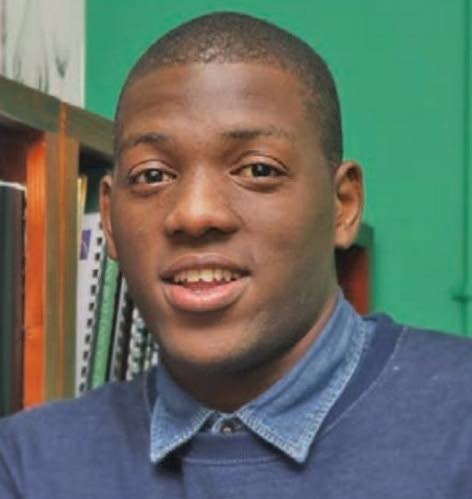One of my greatest fears is to remain average

Colin Robinson
Seems it’s not just Sharda Patasar and I who independently have the same thought. For whatever reason, this week the universe gave the same urging to Gabrielle Hosein, Hema Ramkissoon and me: to share the voices of young African men from communities struggling with violence.
The story of Kareem Marcelle from Beetham Gardens and his family has become familiar to the nation in the year since UWI’s Faculty of Law announced him as the first recipient of its Makandal Daaga scholarship.
It has been told as a dramatic tale of poverty: a mother who decided which of four children there was money to send to school on a given day, who would put water, seasoning and hope on to boil when they were hungry, with nothing but more water to put in the pot when it boiled away. As an epic of a broken home: a sometimes violent father who ran off to marry his other children’s mother in the US, killed her, then set fire to their dwelling. As a saga of the half-hour of tears he wept last Independence Day, opening the e-mail that he’d won the scholarship, unable to remember any day in 22 years before that could be described as happy.
In any telling, it calls us to account for what we have achieved as the country with the third highest per-capita GDP in the Americas (behind the US and Canada).
But these were not the stories I wanted Kareem to re-tell. I asked him to tell me other stories. And he did.
Both his grandmothers come from the Beetham. His father’s family received priority for relocation to Beetham Gardens after the John John fire. His mother’s family was among the Shantytowners. His two brothers run a small business there that his mother started. His parents, involved from secondary school, lived together unmarried. Both worked, his mother earning twice his father’s pay, yet the family of six’s combined monthly income was under $2,500.
For Marcelle, organiser of a handful of neighbourhood initiatives, including a Christmas party, his mother is the model for activism. She poured herself into community-building, he recalls, including protests over police and state accountability, so much so that she drew the attention of Patrick Manning, who urged her to consider a different vehicle for leadership. Keith Rowley appointed her an alderman on the regional corporation after the 2013 election.
But no parliamentary representative has, in his memory, ever lived in the Laventille West constituency, and it’s been under-represented for as long. His mother’s morals and values, he is firm, are the source of his; but her politics aren’t. He believes, besides, that you need to be well-established financially before you speak out in politics, to avoid being vulnerable to victimisation.
With all her initiative, why didn’t she seize this political access to move her children out of the violence and injustice, I ask. Lack of income, he reasons. But he is glad she did not, because Beetham Gardens is where his purpose is grounded; transforming the community is his life mission. Change will come from young people who no longer blindly vote party and race, as other families have.
How do young people like him understand the complicated problems of communities like his, I most wanted to know. And what are his policy solutions for change?
His stories have included running into highway traffic from five firing gunmen who mistook him for a rival gang member. In a place where drive-bys are routine, death, he says, is no source of fear. He supports law enforcement measures—even the anti-gang legislation—as necessary, but laments there isn’t routine legislative consultation with communities over such measures. He thinks, though, that there is much less pressure on young people to join gangs than popularly believed. Maybe two-and-a-half per cent have, by his reckoning. The lure of the lifestyle, however, is distinct: BMWs, women, state contracts.
So how did he end up dreaming of being a lawyer? He suggests it might have to do with the proximity of his primary school, Sacred Heart Boys’, to the DPP’s office. He recalls a study of schoolchildren at Nelson Street, who limited themselves to three options of what they wanted to be when they grew up: police, soldier, or fire officer. For too many of his peers, he laments, CXC passes are their horizon of achievement. He discloses his own limitations on imagining his future, how he applied for the Daaga scholarship just hours before the deadline, and only at the urging of Jonathan Bhagan.
But aren’t those solid, decent jobs, I press, noting he’s already pointed out that not everyone has to excel at academic subjects, versus sports, or a craft.
One of my greatest fears is to remain average, he shares. Why not Chief of Defence Staff? Commissioner of Police? An underwater welder with Atlantic?
My conversation with Kareem continues next week.

Comments
"One of my greatest fears is to remain average"